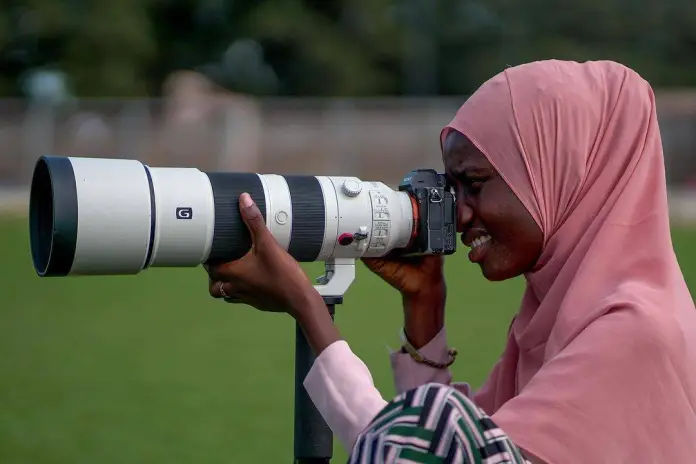Gambiaj.com – (Banjul, the Gambia)- In The Gambia, women sports journalists are steadily rising in a field historically dominated by men, but not without a fight. From navigating gender-based stigma to learning the technical nuances of sports language, these trailblazers are pushing through barriers with passion and resilience.
Nyima Cham, a student at the Media Academy for Journalism and Communication (MAJaC) and a freelance sports reporter, shared her early struggles in understanding the unique language of sports reporting.
“I faced many challenges when I started. The biggest issue was translating sports terminology into understandable and engaging stories. Sometimes, I couldn’t even follow certain articles because of the technical language used,” Nyima said. “But thanks to the guidance of mentors, I am gradually learning and improving.”

Nyima began her freelance sports journalism journey in 2024, with a focus on photography and writing. She hopes to acquire more skills to enhance her craft and become a proficient sports reporter.
Fatou Saho, a veteran sports journalist covering traditional wrestling since 2014, highlighted how difficult it is for women to gain footing in such a male-dominated sport. Wrestling in The Gambia, she explained, is often surrounded by secrecy, cultural taboos, and spiritual practices that can intimidate even the most committed reporters.
“There’s a lot of stigma attached to women covering wrestling. I have faced discrimination and exclusion from my male colleagues who often refuse to assist or answer questions when I am trying to understand the sport better,” Fatou said.
“Wrestling involves rituals like the use of charms and spiritual chants. Sometimes, they sprinkle water in the ring which could touch you, and this can be frightening if you are not familiar with the cultural context. These practices discourage many women from reporting in this space,” she added.
Despite these challenges, Fatou remains committed, fuelled by a deep passion and a mission to break through gender-based barriers. She emphasizes the need for targeted support and training for women in sports journalism, particularly in complex fields like wrestling.
“Many female reporters abandon wrestling coverage due to fear, lack of support, or loss of confidence. It is important we create safe learning environments and offer specialized training for women journalists,” she urged.
Sainabou Sama, a freelance football, basketball, and athletics reporter for Unique Global, discovered her passion for sports early on, inspired by her father who was a footballer. She now devotes her energy to covering multiple sports disciplines.

“What we need most is support,” she stressed. “Stigmatization remains a major issue. People still doubt our capabilities simply because we are women. Capacity-building initiatives tailored for women reporters can help level the playing field.”
Sainabou Marenah, a broadcast journalist at Citizen Network Gambia, also spoke candidly about the challenges of being a woman, particularly a married woman, in the sports reporting landscape.
“I have been reporting for less than two years, but the discrimination is overwhelming. People constantly question my presence in the field. They think football reporting is a man’s job,” she said. “Being married adds another layer of difficulty. There’s often backlash, assumptions, and stereotypes that make this work even harder.”
Despite the odds, these women remain steadfast. Their stories shine a light on the urgent need for institutional support, gender-sensitive training programs, and inclusive newsroom cultures that empower women to excel in sports journalism.










